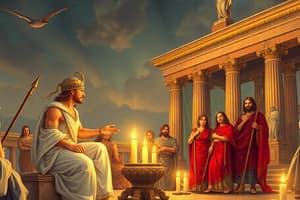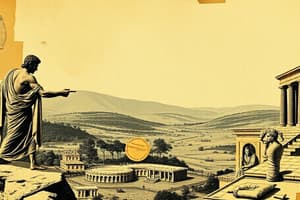Podcast
Questions and Answers
What does the author suggest made the Greek mythos a revolution in thought?
What does the author suggest made the Greek mythos a revolution in thought?
In Greece man first realized what mankind was. They made their gods in their own image.
What is the 'Greek miracle' that the author refers to?
What is the 'Greek miracle' that the author refers to?
The new birth of the world with the awakening of Greece.
What is the author's interpretation of the 'Greek Miracle'?
What is the author's interpretation of the 'Greek Miracle'?
Something like that happened in Greece. Why it happened, or when, we have no idea at all. We know only that in the earliest Greek poets a new point of view dawned, never dreamed of in the world before them, but never to leave the world after them.
What does the author say about the Greek gods' appearance?
What does the author say about the Greek gods' appearance?
What is the author's opinion of the pre-Greek world's concept of gods?
What is the author's opinion of the pre-Greek world's concept of gods?
What does Saint Paul say about understanding the invisible?
What does Saint Paul say about understanding the invisible?
The author claims that Greek gods were not often viewed as frightening.
The author claims that Greek gods were not often viewed as frightening.
Which of the following is NOT a trait of Greek mythology mentioned by the author?
Which of the following is NOT a trait of Greek mythology mentioned by the author?
Based on the text, what is a characteristic of the human gods' nature in Greek Mythology?
Based on the text, what is a characteristic of the human gods' nature in Greek Mythology?
What is a key difference between the Greek gods and gods worshipped by the pre-Greeks, according to the author?
What is a key difference between the Greek gods and gods worshipped by the pre-Greeks, according to the author?
According to the author, what is the most significant change in the world due to Ancient Greek ideas?
According to the author, what is the most significant change in the world due to Ancient Greek ideas?
The author believes that Greek mythologies were never fully complete.
The author believes that Greek mythologies were never fully complete.
How does the author describe Hera's role in Greek mythology?
How does the author describe Hera's role in Greek mythology?
According to the author, what is the significance of the beauty of Greek gods?
According to the author, what is the significance of the beauty of Greek gods?
What does the author say about irrationality in Greek mythology?
What does the author say about irrationality in Greek mythology?
What does the author state about the role of the priest in Greek mythology?
What does the author state about the role of the priest in Greek mythology?
What did the Greeks dislike about their mythology?
What did the Greeks dislike about their mythology?
What does the author suggest about the role of monsters in Greek mythology?
What does the author suggest about the role of monsters in Greek mythology?
Which of the following is NOT a characteristic of the heroes in Greek mythology as described in text?
Which of the following is NOT a characteristic of the heroes in Greek mythology as described in text?
What does the author suggest about the role of myths in understanding the natural world?
What does the author suggest about the role of myths in understanding the natural world?
The author states that myths are always purely factual accounts of real events.
The author states that myths are always purely factual accounts of real events.
According to the author, what is the 'pure entertainment' aspect of myths?
According to the author, what is the 'pure entertainment' aspect of myths?
What does the author compare Greek mythology to?
What does the author compare Greek mythology to?
What does the author suggest about the development of the concept of Zeus?
What does the author suggest about the development of the concept of Zeus?
What does Zeus represent in the Odyssey, according to the author?
What does Zeus represent in the Odyssey, according to the author?
What does the author say about the concept of justice in Greek mythology, specifically in relation to Zeus?
What does the author say about the concept of justice in Greek mythology, specifically in relation to Zeus?
According to the author, what is the significance of Hesiod's portrayal of Zeus?
According to the author, what is the significance of Hesiod's portrayal of Zeus?
How does Chrysostom describe Zeus?
How does Chrysostom describe Zeus?
What is the author's final statement about the Greek perception of the divine?
What is the author's final statement about the Greek perception of the divine?
Flashcards
Mythology
Mythology
The study of how early humans viewed their world and the stories they created to explain it.
The Iliad
The Iliad
The ancient Greek epic poem attributed to Homer, telling the story of the Trojan War.
The Greek Miracle
The Greek Miracle
The birth of a new era of civilization, characterized by a focus on human intellect and achievements.
Mankind at the Center
Mankind at the Center
Signup and view all the flashcards
Gods in Human Image
Gods in Human Image
Signup and view all the flashcards
Egyptian Gods
Egyptian Gods
Signup and view all the flashcards
Mesopotamian Gods
Mesopotamian Gods
Signup and view all the flashcards
Greek Gods: Natural & Beautiful
Greek Gods: Natural & Beautiful
Signup and view all the flashcards
Invisible by the Visible
Invisible by the Visible
Signup and view all the flashcards
Human Focus of Greek Art
Human Focus of Greek Art
Signup and view all the flashcards
Greek Gods: Humanized Heaven
Greek Gods: Humanized Heaven
Signup and view all the flashcards
Zeus: Mischievous King
Zeus: Mischievous King
Signup and view all the flashcards
Hera: Jealous Queen
Hera: Jealous Queen
Signup and view all the flashcards
Friendly Feeling with Gods
Friendly Feeling with Gods
Signup and view all the flashcards
Gods in the Natural World
Gods in the Natural World
Signup and view all the flashcards
Mythology: From Fear to Beauty
Mythology: From Fear to Beauty
Signup and view all the flashcards
Greek Mythology: Rationality
Greek Mythology: Rationality
Signup and view all the flashcards
Monsters in Greek Mythology
Monsters in Greek Mythology
Signup and view all the flashcards
Hercules: The Hero
Hercules: The Hero
Signup and view all the flashcards
Myths: Early Science and Literature
Myths: Early Science and Literature
Signup and view all the flashcards
Myths: Explaining Nature
Myths: Explaining Nature
Signup and view all the flashcards
Myths: Entertainment
Myths: Entertainment
Signup and view all the flashcards
Zeus: Evolution of a God
Zeus: Evolution of a God
Signup and view all the flashcards
Justice in Greek Mythology
Justice in Greek Mythology
Signup and view all the flashcards
Zeus: Protector of the Weak
Zeus: Protector of the Weak
Signup and view all the flashcards
Mythology: Evolving Ethics
Mythology: Evolving Ethics
Signup and view all the flashcards
Greek Search for the Divine
Greek Search for the Divine
Signup and view all the flashcards
Study Notes
Greek Mythology
- Greek mythology is vastly different from the way early humans perceived their surroundings.
- The myths demonstrate a significant evolution from primitive, brutal lives.
- Early Greek myths show advancements in society and civilization.
- The Iliad is the earliest written Greek record, thought to be around a thousand years before Christ.
- Homer is believed to be the author, though the exact date remains uncertain.
- The Iliad represents the earliest Greek literature, written with beauty, clarity and skill, in a rich and subtle language.
- Greek mythology demonstrates evidence of sophisticated civilization.
- Greek myths do not depict accurate historical depictions of early humankind, but are accurate representations of early Greeks.
- The concept of a "Greek miracle" describes the transformative period in Greece. The awakening of Greece brought about new, beautiful and noble ideas that were never conceived before.
- The emergence of Greek ideals led to a great emphasis on the visible and human aspects of life.
- Greek art and culture reflected a focus on the human form, showcasing beauty.
- Classical greek mythology dispenses with irrational elements of magic.
- Supernatural powers are not prevalent in their descriptions; they are realistic and human-centered.
- Greek myths were focused on explanations of natural processes, events, and interactions.
- Myths served an educational purpose and entertainment for that era.
Greek Gods and Humanity
- Gods were depicted in human forms and behaviour.
- Gods were not considered terrifying or mysterious; they were engaging and likeable.
- Zeus was a fun and relatable character.
- Hera, as a jealous wife, was a common archetype.
- Greek gods often demonstrated relatable human emotions like jealousy.
- In Greek mythology, beauty in the human form is considered high praise and a focus.
- The importance of human beings was central in myth, highlighting human potential and interaction.
- Greek myths reflected and developed the idea that humans deserved and deserved to interact with the divine world.
Greek Mythological World
- Early Greek myths reflect less on religion and more on the human understanding of the natural world and human beings.
- The human-centered perspective of Greeks was new.
- Myths represented an explanation of the world around and for the humans.
- Myth and early science helped to clarify understandings of the universe.
- The Greeks attempted to reconcile the chaotic world with their values.
- Heroes, such as Hercules, embodied human strength and resilience against monsters.
- Myths depict human understanding of the world around them.
- Greek imagery and storytelling often explored themes of beauty, power, love, jealousy, and justice.
- The mythical figures often represent characteristics and experiences of human beings.
Studying That Suits You
Use AI to generate personalized quizzes and flashcards to suit your learning preferences.




